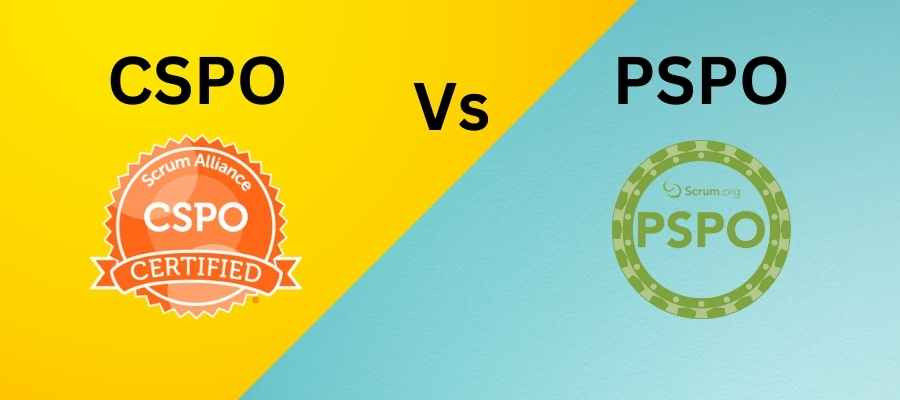CSPO VS PSPO: What are the differences?

Every aspiring Product Owner will, at some point, have to consider getting certification. A certification helps validate a Product Owner’s skills and expertise, opening up more job and project opportunities.
But, it is not always easy to tell which certification to get when just starting. Most people are torn between CSPO and PSPO. The two are the most widely recognized certification in the Scrum framework.
The best way to decide which one to get between these two is by understanding the differences. Also, it helps to know what each is all about and the kind of Product Owner it can benefit.
What is CSPO
CSPO® stands for Certified Scrum Product Owner. A CSPO is someone that has received training from a Certified Scrum Trainer, and they receive certification as evidence of this. Training to get a CSPO certification gives the trainee a better understanding of basic Scrum principles, practices, and terminologies. The knowledge and skills earned during the training allow for better fulfillment of Product Owner roles and responsibilities in the Scrum framework.
Additionally, CSPO certification strongly emphasizes collaboration and stakeholder engagement. Since Product Owners are a bridge between business stakeholders and development teams, the CSPO curriculum includes essential techniques for effective communication, backlog management, and prioritization strategies. This ensures that a CSPO-certified individual can manage product development efficiently while aligning business objectives.
What is PSPO
PSPO™, or Professional Scrum Product Owner, is a certification that Product Owners get after taking and passing a test offered by Scrum.org. PSPO aims to test and validate that one understands the roles of a Product Owner. By focusing on the functions of a Product Owner, PSPO ensures anyone receiving certification is equipped with the right skills to maximize the value of a Sprint or project.
One unique aspect of PSPO certification is its strong focus on evidence-based decision-making. The curriculum includes training on metrics-driven product management, helping Product Owners make data-backed decisions that can optimize a product’s success. This is particularly beneficial for those working in highly analytical environments where data interpretation plays a crucial role in product evolution.
Key Differences Between CSPO and PSPO
These two Product owner certifications differ in several general aspects, such as the bodies responsible for the focus area, accreditation, the certification process, and cost.
|
|
CSPO |
PSPO |
|
Focus Area |
Focuses on understanding Scrum fundamentals, roles within the Scrum Team, and backlog prioritization. |
Emphasizes strategic responsibilities like product vision, maximizing value, and stakeholder collaboration. |
|
Accreditation Body |
Offered by Scrum Alliance, known for its community-driven approach and educational resources. |
Offered by Scrum.org, founded by Scrum co-creator Ken Schwaber, known for rigorous, standardized exams. |
|
Certification Process |
It requires 14-16 hours of training by a certified scrum trainer, with no exam. It emphasizes interactive learning and real-world applications. |
No mandatory training; certification is earned by passing a challenging exam that tests practical knowledge of Product Ownership. |
|
Certification Cost |
Around $500, covering training, materials, and community membership for 2 years. |
$200 for the exam; optional workshops available, increasing the total cost. Two exam attempts are included. |
|
Certification Renewal |
Required every 2 years with a $100 fee and 20 Scrum Education Units, ensuring continuous learning. |
Lifetime credentials with no renewal needed, making it cost-effective long-term. |
|
Difficulty Level |
Easier due to no exam, focusing on learning through interactive training. |
It is more challenging due to a rigorous exam with scenario-based questions testing deep Scrum knowledge. |
|
Learning Approach |
Instructor-led training with real-world case studies and peer networking. |
Self-study with optional workshops, requiring a thorough understanding of the Scrum Guide. |
|
Industry Recognition |
Highly recognized, especially in community-focused organizations favoring continuous learning. |
Equally recognized and preferred by companies valuing strategic and business-focused Product Owner skills. |
Here is a quick overview of these differences in more detail:
Focus Area
The focus area of each certification is well-defined by the accreditation body. A quick check of the respective website should make this clear enough.
That said, the focus area for CSPO® certification is providing a better understanding of how a Scrum Model works. Also, it focuses on the specific roles of the Product Owner in the Scrum Team during a Sprint. During the training, the Certified Scrum Trainer will focus more on ensuring the aspiring Product Owners understand these two areas well.
The focus area of PSPO™, is understanding the overall role of the Product Owner. The functions are not just limited to what part they play in a Scrum Team but also in their other responsibilities, such as defining product vision and evaluating product progress.
Accreditation Body
Both certifications are offered by bodies that are recognized globally. Also, the certificates are open to people from across the world.
CSPO is offered by Scrum Alliance, which has been in operation since the early 2000s. Scrum Alliance is a not-for-profit organization and one of the most reputable Agile certifying bodies. Since they started the process, they have issued more than a million certifications and give out thousands yearly.
Scrum.org offers PSPO™ certification. Although Scrum.org has not been around for as long as Scrum Alliance, it already has more than 370 PSTs (Professional Scrum Trainers) and over 100 training partners. Also, they have already certified more than half a million Product Owners from across the globe.
Scrum.org is known for its consistency and rigorous assessment standards. Unlike Scrum Alliance, which allows for diverse training styles by different CSTs, Scrum.org ensures uniformity by using standardized exams and training materials developed by Ken Schwaber, one of the co-creators of Scrum. This makes PSPO a popular choice for organizations emphasizing consistent Scrum implementation.
Certification Process
There are NO pre-requisites to attend Certified Scrum Product Owner training. But, to get CSPO® certification, you will first need to attend training. The mandatory training usually takes 2 days and must be given by a Certified Scrum Trainer. No Exam Required.
There is no training required before you can take a PSPO™ certification exam. You can simply visit the website, pay, and register to take the exam. But, it would be best if you still did adequate preparation and studying, which you can always get by participating in a Scrum training.
Another important distinction is that PSPO certification follows a tiered approach. After obtaining PSPO I, candidates can progress to PSPO II and PSPO III, which test more advanced knowledge of the Product Owner role, including scaling Scrum and dealing with complex product development scenarios. This allows for continuous learning and skill enhancement.
Certification Cost and Renewal
It will cost you around $500 to get CSPO® certification. But, it is essential to note that the actual cost often depends on where you are since the 2-day training charges will vary. Also, the credentials you earn will be valid for 2 years. The renewal cost is $100, and you also need to have 20 Scrum education units earned in the preceding 2 years.
PSPO certification will cost $200 if you register for the exam online to get the certification only. If you also want to attend their workshop, the cost can get to $500. But you will never need to pay anything else after that. The credentials you earn are lifetime, so you never have to pay for renewal.
CSPO VS PSPO: Which One Should You Choose?
CSPO and PSPO are globally recognized certifications that will help Product Owners get more noticed. The choice between the two depends on what you are looking for and your preferences.
If you are looking for something you can easily do online without having to attend any training and get lifetime certification, PSPO is your best bet.
But, if you want a certification that also comes with much-needed training by a Certified Scrum Trainer, CSPO is the best. Also, CSPO is the best if you want to keep up with emerging trends in the industry since you have to renew it every 2 years.
To summarize, the choice between CSPO and PSPO concerns your learning style and career goals. If you prefer hands-on training, collaboration, and networking with other Agile professionals, CSPO is an excellent choice. However, PSPO could be more rewarding if you want to challenge yourself with a tough exam and are confident in your self-study abilities.
Ultimately, both certifications can open up excellent career opportunities. Still, aligning your choice with your professional objectives and the Agile maturity level of the organizations you aim to work with is essential.
References
1. https://agilemania.com/cspo-vs-pspo/
2. https://dcmlearning.ie/product-owner-resources/pspo-cspo-which-certification
3. https://www.linkedin.com/pulse/cspo-vs-pspo-certification-chetan-sugandhi/




